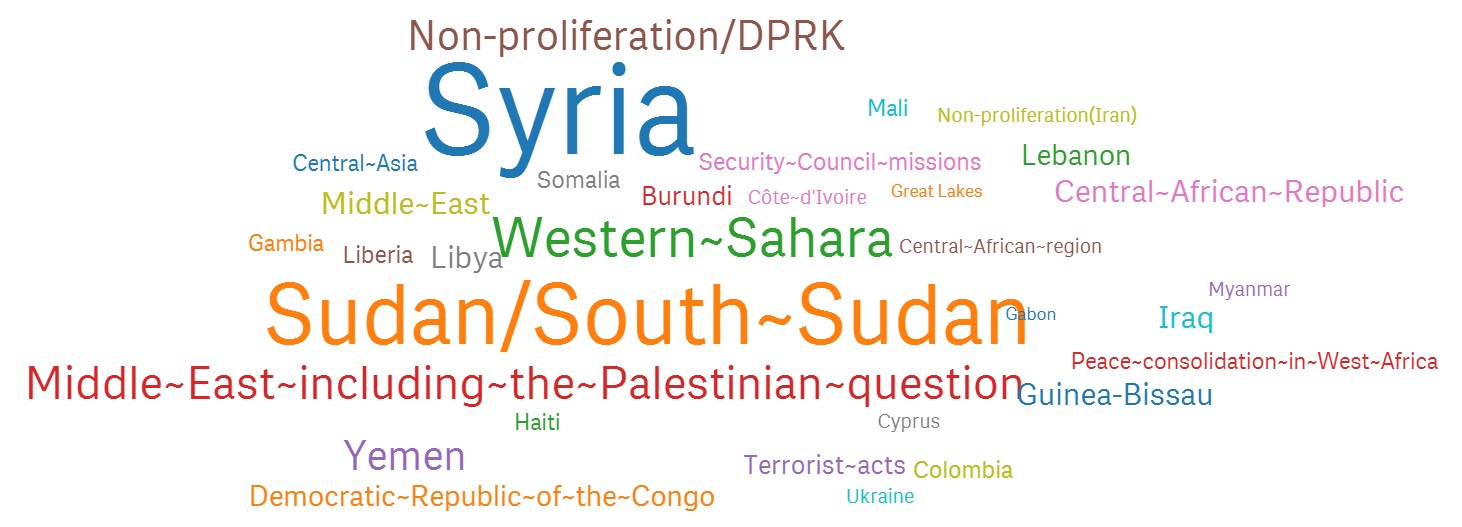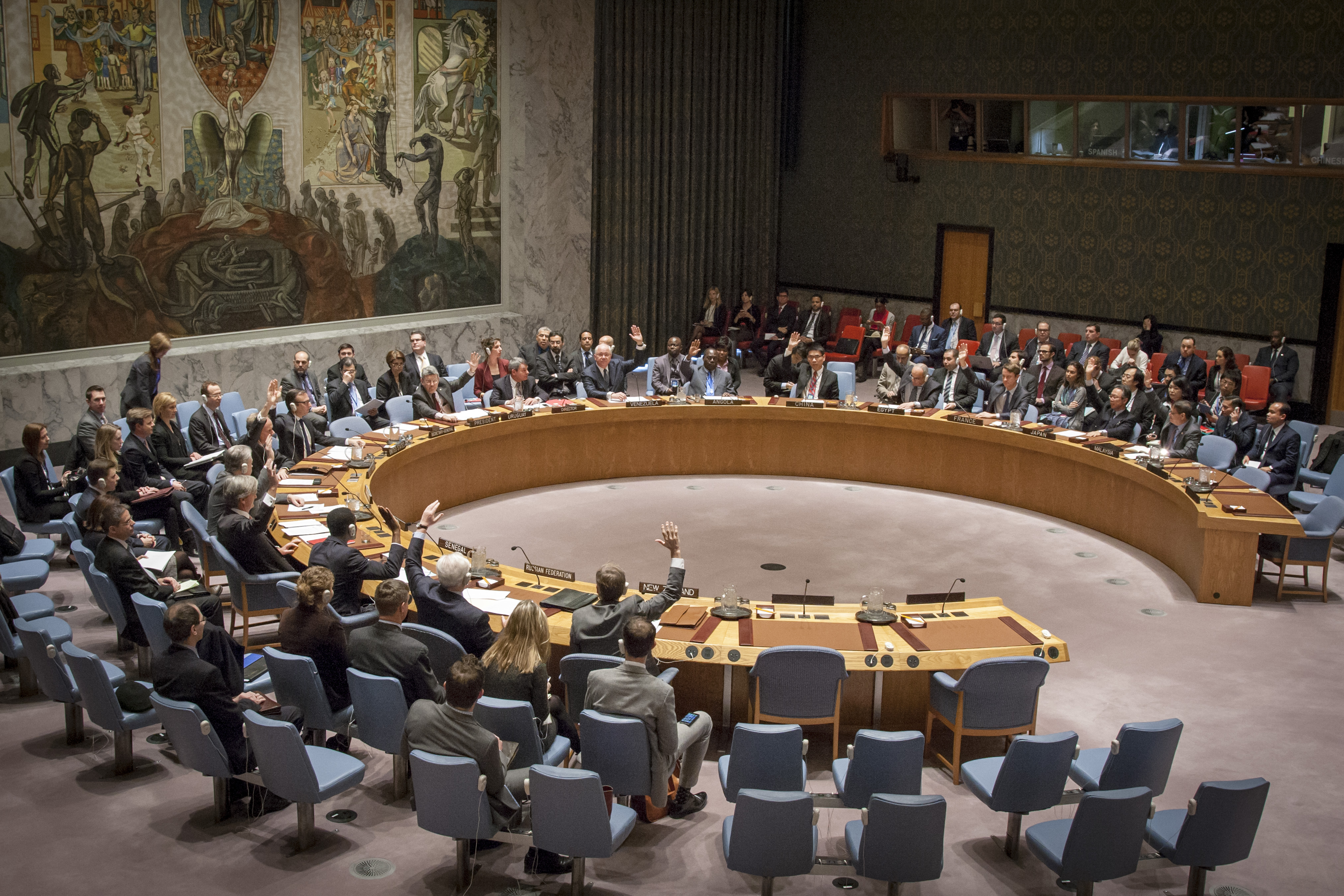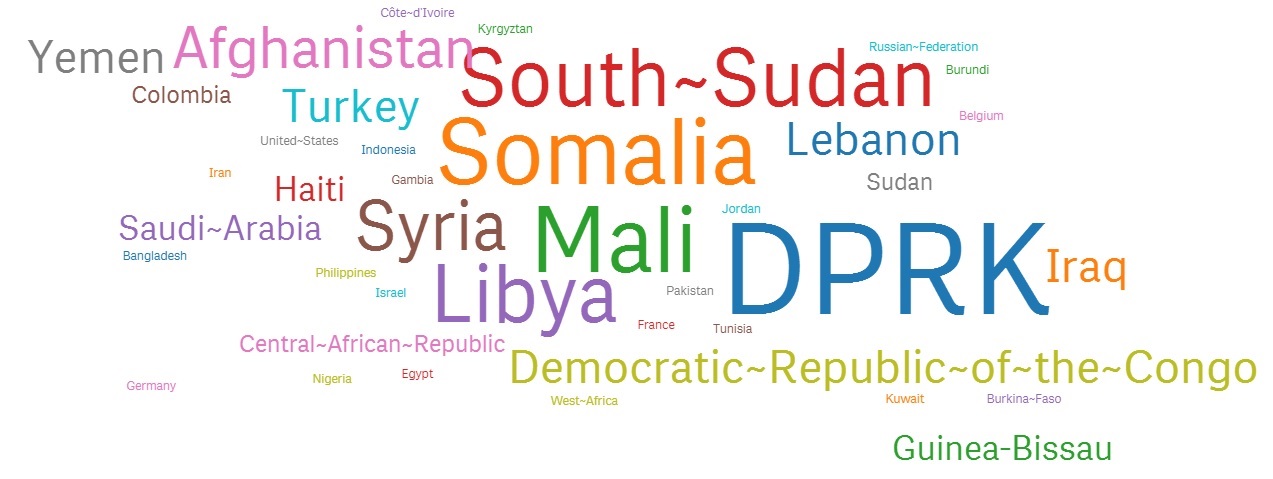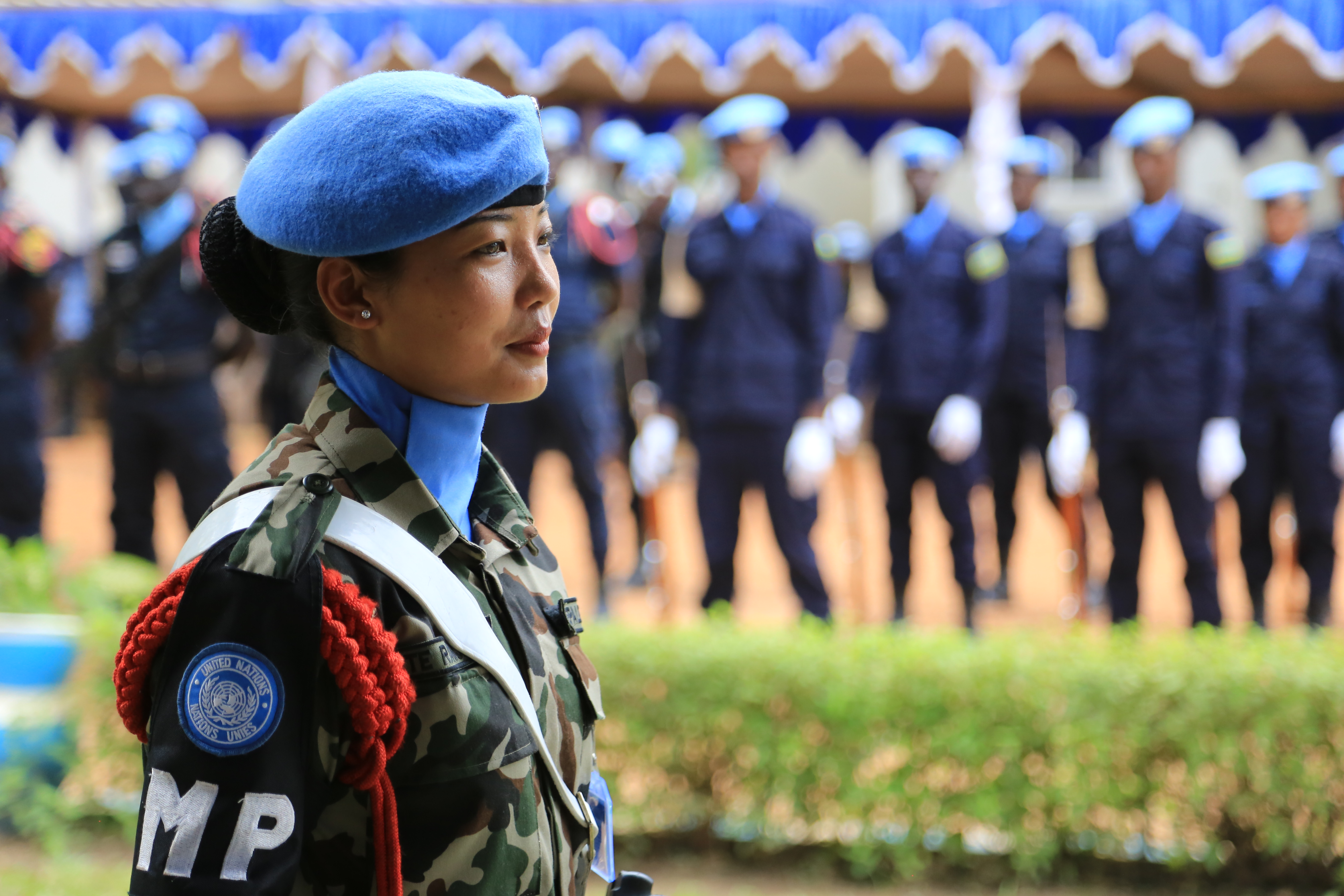Introduction
In 2016, the Security Council held 256 meetings, adopted 77 resolutions and issued 19 presidential statements. It considered 49 agenda items, including 1 new agenda item relating to Colombia. The Council dispatched 5 missions to the field, all of them to Africa. The Council further established 1 political mission, the United Nations Mission in Colombia, and terminated 3 subsidiary bodies, namely the 1521 Committee concerning Liberia (including its Panel of Experts), the 1572 Committee concerning Côte d'Ivoire (including its Group of Experts) and the 1737 Committee concerning the Iranian nuclear issue (including its Panel of Experts). In addition, in 2016, the Council issued 1140 documents, the highest number of documents issued by the Council since 2012.
MEETINGS

UN Photo/Rick BajornasSecurity Council Debates Protecting Civilians in Peacekeeping Operations (10 June 2016).
Meetings of the Security Council are governed by Article 28 of the Charter of the United Nations, and rules 1-5 and 48 of its provisional rules of procedure. Under its current practice, the Council convenes meetings, which are classified as either public or private. Council members also frequently meet in informal consultations of the whole (also known as consultations).
Overview
In 2016, the Security Council held 256 meetings: 237 public meetings and 19 private meetings. With the exception of 2 meetings on the agenda items titled “Recommendation for the appointment of the Secretary-General of the United Nations” and “Briefing by the President of the International Court of Justice” respectively, all other private meetings were with police- and troop-contributing countries (P/TCCs). In addition to the 169 consultations held during 2016, the Council had substantive briefings and/or discussions under “Other matters” (also known as “Any Other Business” (AOB)), in 44 instances.
Chart 1: Number of meetings and consultations: 2012-2016
Meetings and consultations
In 2016, the Council held, on average, 21 meetings and 14 consultations per month. December was the month with the most meetings and consultations held, with 33 meetings (31 public and 2 private) and 17 consultations.
Chart 2: Number of meetings and consultations by month in 2016
* “Other matters” refers to the substantive briefings and/or discussions under “Other matters” (also known as “Any Other Business” (AOB)).
13
In 2016, the Council held 13 high-level meetings, in which 2 or more Council members were represented at ministerial level or above [For details see Annex, Table I].
Chart 3: Number of high-level meetings: 2012-2016
79
The Council continued to use video tele-conferencing (VTC) for meetings and consultations, a practice that has become increasingly common since its introduction in 2009. In 2016, the Council was briefed by VTC 79 times.
Chart 4: Use of video tele-conferencing: 2012-2016
4 / 12
In 2016, the practice of holding Arria formula meetings and informal interactive dialogues (IID) continued. IIDs, also known as informal interactive discussions, are chaired by the President of the Council and are intended to allow Council members to informally exchange views with interested parties on specific topics. Arria formula meetings on the other hand, are used by Council members as a flexible and informal forum to enhance their deliberations. In 2016, the Council held 4 IIDs and 12 Arria formula meetings. On 22 April, the Council held an Arria-formula meeting under the title “Water, peace and security”. This was the first time that Council members discussed water in relation to peace and security. In addition, on 8 August, for the first time since its introduction in 1992, an Arria formula meeting under the title “Aleppo under siege: Syria’s latest tragedy unfolds” was webcast. [For details see Annex, Tables II and III].
Chart 5: Number of informal interactive dialogues and Arria formula meetings: 2012-2016
Informal consultations of the whole
In 2016, Council members held 169 consultations on a variety of topics. In a number of those scheduled consultations, other topics were raised under the item “Other matters” leading to substantive briefings and/or substantive discussions in 44 instances. The most discussed topics in consultations during 2016 were: (i) Syria (50 times); (ii) Sudan/South Sudan (31 times); (iii) Western Sahara (18 times); (iv) Middle East, including the Palestinian question (14 times); and (v) Yemen and Non-proliferation/DPRK (which were both discussed a total of 12 times each). Below is an infographic of topics discussed at least 3 times in consultations during 2016.
Figure 1: Frequency of topics discussed in informal consultations of the whole in 2016

MISSIONS

UN Photo/Isaac BillySecurity Council Delegation Visits South Sudan (3 September 2016).
In the presidential note of 26 July 2010 on working methods of the Council (S/2010/507), the Council underlined the value of its missions in order to understand and assess particular conflicts or situations on the agenda of the Council. Furthermore, Article 34 of the Charter of the United Nations provides that the Security Council may investigate any dispute or any situation which may lead to international friction or give rise to a dispute. Missions of Council members to the field have taken place since 1964.
Missions in 2016
In 2016, 5 Security Council missions were dispatched. The last time that the Council dispatched as many missions to the field was in the year 2000. In addition, all 5 missions were dispatched to Africa. In January, the Council sent a mission to Burundi and Ethiopia. In March, the Council went on mission to West Africa (Mali, Guinea-Bissau and Senegal). In May, the Council sent a mission to the Horn of Africa (Somalia, Kenya and Egypt). In September, the Council undertook a mission to South Sudan and Ethiopia. And finally, in November, the Council dispatched a mission to the Democratic Republic of the Congo and Angola.
Africa
January 2016
| Mission to: | Co-Led By | Led By |
|---|---|---|
| Burundi | Angola, France and the United States | |
| Ethiopia | Egypt | |
| holder |
Africa
March 2016
| Mission to: | Co-Led By | Led By |
|---|---|---|
| Mali | France and Senegal | |
| Guinea-Bissau | Angola and Senegal | |
| Senegal | Angola |
Africa
May 2016
| Mission to: | Co-Led By | Led By |
|---|---|---|
| Somalia | Egypt and the United Kingdom | |
| Kenya | Egypt | |
| Egypt | Egypt |
Africa
September 2016
| Mission to: | Co-Led By |
|---|---|
| South Sudan | Senegal and the United States |
| Ethiopia | Senegal and the United States |
| 1 |
Africa
November 2016
| Mission to: | Co-Led By | |
|---|---|---|
| Democratic Republic of the Congo | Angola and France | |
| Angola | Angola and France |
Chart 6: Number of Security Council missions by region: 2012-2016
AGENDA

UN Photo/Amanda Voisard
Security Council High-level Briefing on Colombian Peace Agreement (21 September 2016).
In accordance with rule 11 of the provisional rules of procedure and presidential note S/2010/507, every January, the Council reviews the list of matters of which it is seized. Agenda items which have not been considered at a Council meeting in the preceding three years are deleted unless a Member State objects. In the latter case, an item will remain on the list for an additional year, and will be subject to the same procedure described above if not considered by the Council during that additional year.
Overview
In 2016, the Security Council considered a total of 49 agenda items. The Council added to its agenda a new item entitled “Identical letters dated 19 January 2016 from the Permanent Representative of Colombia to the United Nations addressed to the Secretary-General and the President of the Security Council (S/2016/53)”. In addition, as from 22 June 2016, the agenda item entitled “Post-conflict peacebuilding” was subsumed under the agenda item entitled “Peacebuilding and sustaining peace” (S/2016/560). Out of the 49 agenda items, 27 dealt with country-specific or regional situations and 22 with thematic and other issues [For details, see Annex, Table IV]. In addition, 1 agenda item, namely, “The situation in Timor-Leste”, was deleted from the list of matters of which the Security Council is seized, keeping the total number of agenda items on the list of the Council at 68. [For details, see Annex, Table V].
Chart 7: Percentage of meetings on country-specific/regional situations and thematic and other issues in 2016
Chart 8: Number of meetings held and resolutions/PRSTs adopted by agenda item in 2016
* Under Security Council resolution 1244 (1999)
Country-specific and Regional Situations
In 2016, 70% (178) of the meetings of the Council dealt with country-specific or regional situations. Among those meetings, Africa accounted for 53.9% (96) of the meetings, followed by the Middle East with 33.1% (59), Europe with 5.1% (9), Asia with 4.5% (8) and the Americas with 3.4% (6) [See Chart 9].
Chart 9: Percentage of meetings by geographic region in 2016
Thematic and Other Issues
In 2016, 30% of Council meetings (78) were held under agenda items of a thematic or cross-cutting nature. The Council continued the practice of conducting wrap-up sessions under the agenda item entitled “Implementation of the note by the President of the Security Council (S/2010/507)” and did so at the end of the month in January, February, May and August. All 4 meetings were conducted in public sessions. Also, under the same agenda item, on 19 July, on the occasion of the tenth anniversary of the adoption of the first note by the President of the Security Council (S/2006/507), the Council held its annual open debate to consider its working methods (S/PV.7740).
DECISIONS AND VOTING

UN Photo/Loey FelipeSecurity Council Votes on Situation in Central African Republic (27 January 2016).
According to Article 27 of the Charter of the United Nations, each Council member has one vote. An affirmative vote of nine members is required for decisions to be adopted on procedural and substantive matters, including in the latter case the concurrent votes of the permanent members. In addition to procedural decisions related to the adoption of the agenda, extension of invitations and adjournment of meetings, the Council adopts resolutions and issues presidential statements. Council decisions also take the form of notes and letters by the President of the Council.
Overview
In 2016, the Security Council adopted a total of 77 resolutions and issued 19 presidential statements. 62 of the 77 resolutions and 13 of the 19 presidential statements concerned country or region specific situations or conflicts; Africa accounted for 64% of those resolutions and presidential statements, followed by the Middle East with 21.3%, Asia with 6.7%, Americas with 4% and Europe with 4% [See Chart 11]. Out of its 77 resolutions, 54.5% (42) were explicitly adopted under Chapter VII of the Charter, and 30 of the 42 (71.4%) concerned the region of Africa. The Council also issued 14 notes and 45 letters by its President.
Chart 10: Number of resolutions, presidential statements, notes and letters by the President: 2012-2016
Chart 11: Percentage of decisions by geographic region in 2016
In 2016, the Council also issued 106 press statements, of which 53.8% (57) concerned terrorist-related activities, attacks against civilians or attacks against United Nations personnel in the field. In 2016, 10.4% (11) of the press statements related to nuclear non-proliferation. In addition, the most referenced countries or regions in press statements were: (i) DPRK (11 times); (ii) Mali and Somalia (8 times each); (iii) Libya and South Sudan (7 times each); (iv) Syria (6 times); and (v) Afghanistan (5 times).
Figure 2: Frequency of countries referred to in press statements in 2016

Voting
In 2016, out of 77 resolutions adopted, 67 (87%) were adopted unanimously. In 2016, 2 vetoes were cast and 2 draft resolutions failed to obtain the required number of votes (see below). The two vetoes were cast in relation to draft resolutions put to a vote in connection with the agenda item “The situation in the Middle East” in the context of the conflict in the Syrian Arab Republic. In addition, in 2016, there was 1 procedural vote, concerning the adoption of the provisional agenda on the item entitled “The situation in the Democratic People’s Republic of Korea” (S/PV.7830).
Chart 12: Voting on draft resolutions: 2012-2016
Draft resolutions not adopted in 2016
| Draft resolution | Meeting | Date | Agenda | Votes in favour | Vote Against | Abstensions |
|---|---|---|---|---|---|---|
| S/2016/846 | 7785 | 8 October 2016 | The situation in the Middle East |
11 (Egypt, France, Japan, Malaysia, New Zealand, Senegal, Spain, Ukraine, United Kingdom, United States of America and Uruguay) |
2 (Russian Federation and Venezuela (Bolivarian Republic of)) |
2 (Angola and China) |
| S/2016/847 |
4 (China, Egypt, Russian Federation and Venezuela (Bolivarian Republic of)) |
9 (France, Japan, Malaysia, New Zealand, Senegal, Spain, Ukraine, United Kingdom and United States of America) |
2 (Angola and Uruguay) |
|||
| S/2016/1026 | 7825 | 5 December 2016 | The situation in the Middle East |
11 (Egypt, France, Japan, Malaysia, New Zealand, Senegal, Spain, Ukraine, United Kingdom, United States of America and Uruguay) |
3 (China, Russian Federation and Venezuela (Bolivarian Republic of)) |
1 (Angola) |
| S/2016/1085 | 7850 | 23 December 2016 | Reports of the Secretary-General on the Sudan and South Sudan |
7 (France, New Zealand, Spain, Ukraine, United Kingdom, United States of America and Uruguay) |
0 |
8 (Angola, China, Egypt, Japan, Malaysia, Russian Federation, Senegal, Venezuela (Bolivarian Republic of)) |
Cross-cutting issues in country-specific decisions of the Security Council
In 2016, the Council continued its practice of including provisions on cross-cutting issues, namely the Protection of Civilians (POC), Women and Peace and Security (WPS) and Children and Armed Conflict (CAAC), in its decisions relating to country-specific or regional situations. In 2016, 72% of resolutions and presidential statements relating to country-specific or regional situations contained one or more provision on POC, 51% on WPS and 35% on CAAC.
Chart 13: Number of decisions adopted under country-specific or regional situations with provision on POC, WPS or CAAC: 2012-2016
Resolutions under Chapter VII
In 2016, the Council adopted 42 out of its 77 resolutions explicitly “acting under Chapter VII of the Charter”, including 6 resolutions (3 on the situation in South Sudan 2271 (2016), 2280 (2016) and 2290 (2016), and 3 on non-proliferation/DPRK 2270 (2016) and 2276 (2016) and 2321 (2016) explicitly “acting under Article 41 of Chapter VII of the Charter” [For details see Annex, Table VI]. The majority of the 42 resolutions adopted under Chapter VII (57%) extended and modified mandates of peacekeeping operations and sanctions related bodies. By resolution 2283 (2016) of 28 April, the Council decided to lift all sanctions measures imposed against Côte d’Ivoire and by resolution 2288 (2016) of 25 May, the Council terminated all remaining sanctions measures (arms embargo) against Liberia.
Chart 14: Resolutions adopted explicitly under Chapter VII of the Charter in 2016
SUBSIDIARY BODIES

UN Photo/Nektarios Markogiannis The United Nations Multidimensional Integrated Stabilization Mission in the Central African Republic (MINUSCA) Marks International Peacekeepers Day (28 May 2016).
UN Peacekeeping Operations, Political Missions and Peacebuilding Offices
In the course of 2016, the Council adopted decisions concerning the mandate of 13 peacekeeping operations (PKOs) (out of 16 that were in operation in 2016) and 7 political missions and peacebuilding offices (out of 11 that existed in 2016), primarily extending their mandates. The Council also established 1 new political mission in Colombia (the United Nations Mission in Colombia), to monitor and verify the definitive bilateral ceasefire and cessation of hostilities, and the laying down of arms in Colombia.
Changes in Mandate
In 2016, several peacekeeping operations, political missions and peacebuilding offices underwent significant changes in their mandate. For more details see the comprehensive Mandate Table of current peacekeeping and political missions.
Changes in Authorized Strength
In 2016, 6 PKOs underwent revisions of their respective authorized ceiling of troop and/or police strength. In addition, in 2016, the Security Council approved the Secretary-General’s recommendation of about 450 observers for the United Nations Mission in Colombia.
| PKO | Authorized Troops | Authorized Police | ||
|---|---|---|---|---|
| MINUSCA (Central African Republic) | +68 | S/RES/2264 (2016) | ||
| MINUSMA (Mali) | +2,049 | S/RES/2295 (2016) | +480 | S/RES/2295 (2016) |
| UNFICYP (Cyprus) | +28 | S/RES/2263 (2016) | ||
| UNMIL (Liberia) | -806 | S/RES/2333 (2016) | -296 | S/RES/2333 (2016) |
| UNMISS (South Sudan) | +4,000 | S/RES/2304 (2016) | +100 | S/RES/2327 (2016) |
| UNOCI (Côte d’Ivoire) | -1,437 -1,969 | S/RES/2260 (2016) S/RES/2284 (2016) | -1,250 | S/RES/2284 (2016) |
Map: UN Peacekeeping Operations, Political Mission and Peacebuilding Offices in 2016
Sanctions and other Committees and Working Groups
Committees and Working Groups met a cumulative number of 139 times in 2016, in both formal and informal formats, as well as in joint meetings. A total of 7 briefings to Member States were also conducted by Sanctions and other Committees.
Chart 15: Number of meetings and briefings per Sanctions and other Committees and Working Groups in 2016
Individuals and entities on Security Council sanctions and restrictive measures lists
As of 31 December 2016, a total of 640 individuals and 370 entities were subject to United Nations targeted sanctions and restrictive measures such as assets freeze, travel ban and arms embargo. A consolidated list containing the names of the individuals and entities subject to United Nations targeted measures is also available on the Security Council Subsidiary Organs website. In 2016, 50 individuals and 25 entities were added to the list. The charts below illustrate the number of listed individuals and entities for each sanctions committee as well as those added this year. Information on each committee, including individuals and entities designated by the relevant committee and the applicable sanctions measures, as well as the procedures for the processing of listing and delisting requests can be found on the Security Council Subsidiary Organs website.
Chart 16 (a): Total number of individuals and entities listed in 2016
Chart 16 (b): Number of individuals and entities listed as of 31 December 2016
* Upon implementation of Security Council resolution 2231 (2015)
De-listings from Security Council Sanctions Committees’ Lists in 2016
In 2016, 53 individuals and 84 entities were removed (also referred to as “de-listed”) from the respective sanctions lists. De-listing requests in relation to the ISIL (Da’esh) & Al-Qaida Sanctions List are submitted directly to the ISIL (Da’esh) & Al-Qaida Sanctions Committee or the Office of the Ombudsperson. De-listing requests with respect to all other sanctions lists are submitted to the respective sanctions committees or through the Focal Point for De-listing in the Secretariat. Any Member State can propose the de-listing of an individual or an entity. The relevant committee then considers the proposal, often in consultation with the designating state, and makes a final decision of whether or not to de-list. Often those proposing de-listings are the state of citizenship or residence of a listed individual, the state of location or place of registration of a listed entity, the designating state itself, or a Council member.
Chart 17: Number of names removed (de-listings from Security Council Sanctions Committees) in 2016
* The 20 individuals and 16 entities were automatically de-listed on implementation of Security Council resolution 2231 (2015)
Focal Point for De-listing and Office of the Ombudsperson
In addition to the Member States’ ability to de-list, two mechanisms have been established to strengthen the de-listing process. The Office of the Focal Point for De-listing, established in 2006, has received a total of 85 requests, concerning 62 individuals and 39 entities. 84 of these requests have been processed by 31 December 2016 and 1 is pending. As a result of this process, a total of 17 individuals and 17 entities have been de-listed and 36 individuals and 20 entities remain on the list. The Office of the Ombudsperson, established to serve as the de-listing mechanism for the ISIL (Da’esh) & Al-Qaida Sanctions Committee, has received a total of 78 requests, since 2009, of which 67 have been processed and 11 are pending. As a result, a total of 46 individuals and 28 entities have been de-listed and 13 listings remain.
Chart 18: Activities of the Office of the Focal Point for De-listing as of the end of 2016
Chart 19: Activities of the Office of the Ombudsperson as of the end of 2016
Mandate extensions of Security Council subsidiary bodies
The chart below shows the number of Council resolutions extending the mandate of subsidiary bodies of the Council by month over the last 5 years [For details, see Annex, Table VII].
Chart 20: Mandate renewal by month: 2012-2016


